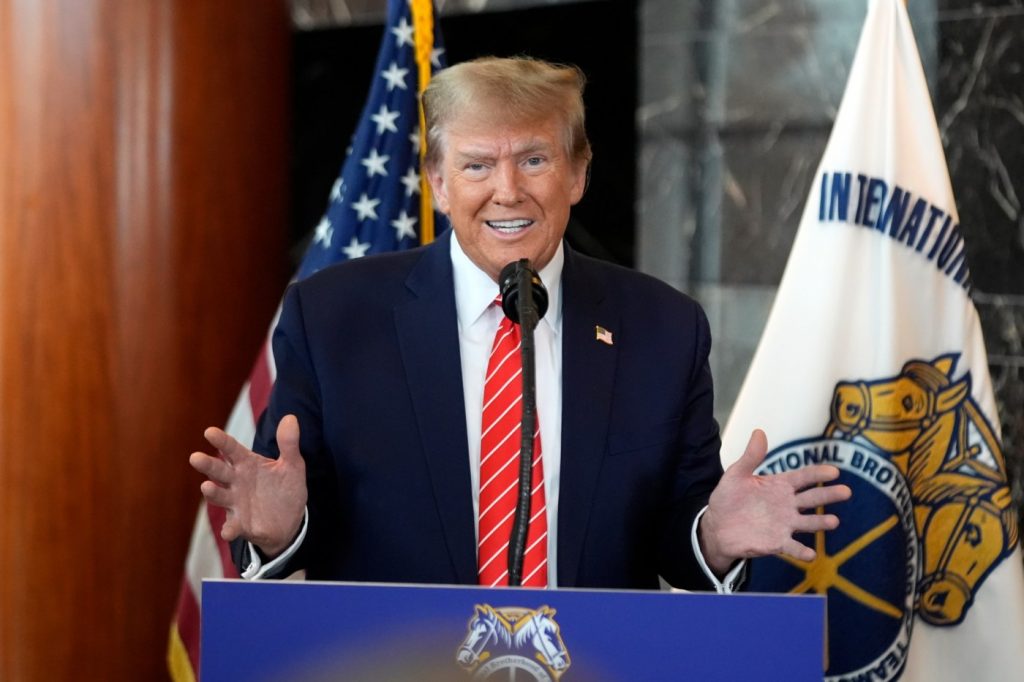A federal appeals court said Tuesday that Donald Trump is not immune from prosecution for alleged crimes he committed during his presidency, flatly rejecting Trump’s arguments that he shouldn’t have to go on trial on federal election subversion charges.
Related Articles
Analysis: What the border bill would and wouldn’t do
Read: Donald Trump presidential immunity ruling
Donald Trump is not immune from prosecution in his 2020 election interference case, US appeals court says
Fact Check: Yes, Trump did endorse Sen. James Lankford
Where Donald Trump stands in his myriad court cases
In a striking 57-page unanimous opinion, the panel of three DC Circuit judges wrote that the public interest in holding a potentially criminal president accountable outweighed any potential “chilling effect” on the presidency.
“We cannot accept that the office of the Presidency places its former occupants above the law for all time thereafter,” the opinion says.
“Former President Trump lacked any lawful discretionary authority to defy federal criminal law and he is answerable in court for his conduct,” the judges added.
Trump has pledged to appeal and has until Monday to ask the Supreme Court to temporarily block the ruling.
It’s not certain how long the Supreme Court could take to consider such a request or an appeal, which would come as special counsel Jack Smith seeks to bring Trump to trial. An early March trial date has already been postponed.
Here are the key takeaways from Tuesday’s decision:
Presidents do not have ‘unbounded authority to commit crimes’
Throughout their opinion, Judges Karen LeCraft Henderson, Florence Pan and J. Michelle Childs repeatedly eviscerated Trump’s alleged behavior after the 2020 presidential election as unpresidential and constituting an assault on American institutions.
Trump’s stances in court, the judges wrote, stand in contrast to the principle that all Americans – including former presidents – are subject to the same laws.
Childs and Pan were appointed by President Joe Biden. Henderson was appointed by former President George H.W. Bush.
Trump’s behavior after the 2020 election could be criminal
The judges were clear that the charges against Trump are serious and left no question they believe can be prosecuted.
The panel describes Trump as using his seat of power to “unlawfully overstay his term as President and to displace his duly elected successor,” all which would violate “generally applicable criminal laws.”
Read: Donald Trump presidential immunity ruling
At a basic level, the three judges wrote that the conduct alleged in Trump’s criminal indictment “conflicts” with his constitutional duties as president and “violated the constitutionally established design for determining the results of the Presidential election as well as the Electoral Count Act of 1887, neither of which establishes a role for the President in counting and certifying the Electoral College votes.”
‘Vital public interest’ of letting trial proceed weighed heavily on the court
Throughout the 57-page ruling, the judges repeatedly referred to the public interest of letting the Trump trial move forward.
They cited the public interest in accountability for potential crimes committed by a former president, and how that overcame Trump’s argument that immunity was necessary to protect the institution of the presidency.
“We conclude that the interest in criminal accountability, held by both the public and the Executive Branch, outweighs the potential risks of chilling Presidential action and permitting vexatious litigation,” the judges wrote in their opinion. “We have balanced former President Trump’s asserted interests in executive immunity against the vital public interests that favor allowing this prosecution to proceed.”
The judges flatly rejected Trump’s claim that his criminal indictment would have a “chilling effect” on future administrations. Trump argues that presidents might be more hesitant to act if they were concerned about the prospect of criminal charges.
The panel went on to quote a Nixon-era Supreme Court ruling about the bounds of presidential immunity, saying, “The federal prosecution of a former President fits the case ‘[w]hen judicial action is needed to serve broad public interests’ in order to ‘vindicate the public interest in an ongoing criminal prosecution.’”
These findings were consistent with the rationale provided by District Court Judge Tanya Chutkan, who similarly dismantled Trump’s immunity claims in resounding fashion last year.
Impeachment acquittal does not absolve Trump
The judges also rejected Trump’s argument that because the Senate did not convict him on the charge of inciting an insurrection in the wake of the Capitol riot in 2021, he cannot be charged criminally for the same crime.
“Other courts have rejected this ‘tortured’ interpretation,” of the law, the judges wrote, adding that “former President Trump’s reliance on a negative implication is an immediate red flag.”
Trump’s reading of the Constitution, the judges added, “would leave a President free to commit all manner of crimes with impunity, so long as he is not impeached and convicted.”
During the impeachment trial in 2021, several Republican senators who voted to acquit Trump, including Senate GOP Leader Mitch McConnell, said they were doing so because the courts and justice system could still hold Trump accountable.
In the decision, the judges also noted that impeachment proceedings are political in nature and acquittals in Congress “are often unrelated to factual innocence.”
“The forty-three Senators who voted to acquit him relied on a variety of concerns, many of which had nothing to do with whether he committed the charged offense,” they wrote.
Trial timing will be up to the Supreme Court
A key part of Trump’s legal strategy has been to delay his criminal cases until after the 2024 election, and the four weeks between oral arguments at the appeals court and Tuesday’s ruling has already meant next month’s March 4 trial date has been scrapped.
Perhaps to speed things along, the appeals court established a quick schedule for Trump to respond to Tuesday’s ruling, giving Trump until February 12 to file an emergency stay request with the Supreme Court.
That would stop the clock while his attorneys craft a more substantive appeal on the merits. If Trump is successful with getting the Supreme Court to hear the appeal, the criminal trial would not resume until after the high court decides what to do with his request for a pause.
The Supreme Court, however, can take as long as it likes at each step. The justices determine how long the Justice Department will have to respond to any Trump petition, how long Trump has to respond and controls when it would make any ruling.
Trump’s team can also appeal to the full DC Circuit to take up the case en banc, meaning the case would be heard again, but this time by the full panel of circuit judges.
If Trump does not appeal the ruling, the case would be sent back to the trial-level court in Washington, DC, as soon as next week, for pre-trial proceedings to resume.
Describes the president as an ‘officer’
One paragraph in Tuesday’s ruling has caught the attention of legal experts who are also watching the 14th Amendment “insurrectionist ban” case that is being argued at the Supreme Court on Thursday.
The cases are entirely separate – this is a criminal prosecution against Trump, and the upcoming Supreme Court case is a civil attempt to remove Trump from state ballots. Further, the appeals court’s findings and explanations in Tuesday’s ruling are not binding on the Supreme Court.
Nonetheless, the appeals ruling refers described the president as an “officer.” There is an open legal question – being argued Thursday before the Supreme Court – over whether the presidency is an “office… under the United States” and whether the presidency is an “officer,” as described in the insurrectionist ban.
The appeals ruling said: “It would be a striking paradox if the President, who alone is vested with the constitutional duty to ‘take Care that the Laws be faithfully executed,’ were the sole officer capable of defying those laws with impunity.”
The-CNN-Wire
& © 2024 Cable News Network, Inc., a Warner Bros. Discovery Company. All rights reserved.


